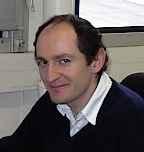

Laboratoire de Biométrie et Biologie Évolutive
UMR CNRS 5558
Université Claude Bernard - Lyon 1
43, bd. du 11 Novembre 1918
69622 Villeurbanne Cedex
France
Email: perriere@biomserv.univ-lyon1.fr

After obtaining my Ph.D., in October 1992, I have got a tenure position at the French National Center for Scientific Research (CNRS), and I have spent one year in Japan at the National Institute of Genetics in the town of Mishima. During my stay in Japan, I have built the non-redundant Bacillus subtilis database NRSub. At the end of this year I was also able to understand the meaning of this (for non-japanese speakers, the translation is available here).
In the continuity of NRSub, I have also developed EMGLib, a library devoted to the completely sequences genomes of unicellular organisms.
After my come back in France, I have developed the World-Wide Web server you are browsing now. This server allows to query general (EMBL, GenBank, NBRF) or specialized (HOVERGEN, HOBACGEN and EMGLib) sequence databases. These databases are indexed with the ACNUC management system. WWW-Query also allows to use on-line sequence analysis tools.
Presently, I am working mainly on HOBACGEN, a database of homologous genes in bacteria. I have developed this system and I am using it to study the existence of horizontal transfers of genes between bacterial species.
At last, I am writing Java tools for sequence analysis For instance I have participated to the development of JaDis a Java application allowing to compute distances between sequences.
If you want, you can have a look at my scientific bibliography or at my bookmarks.
